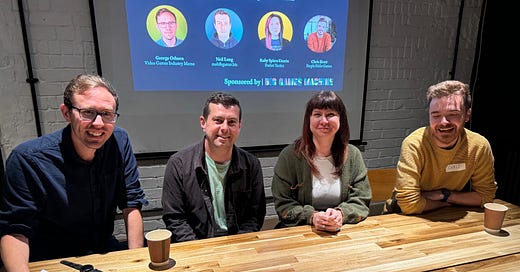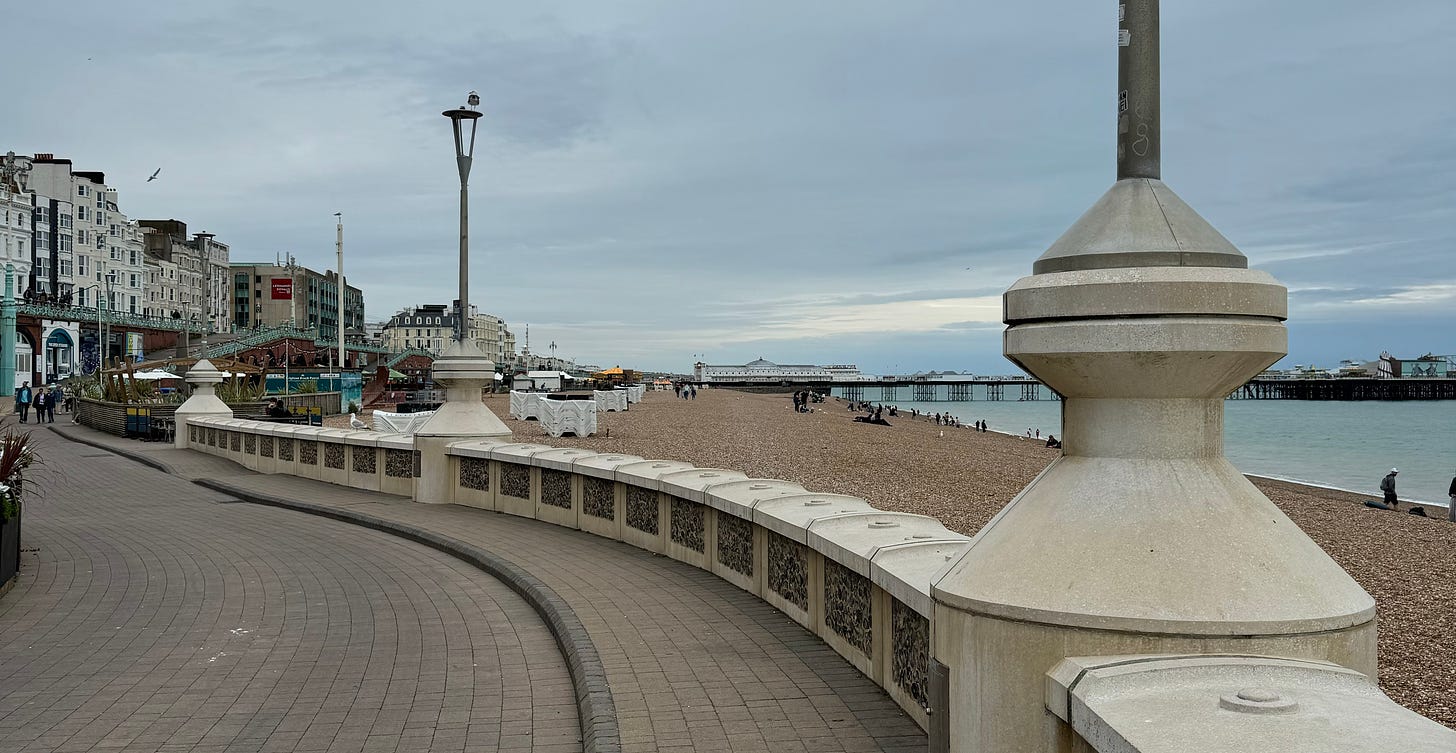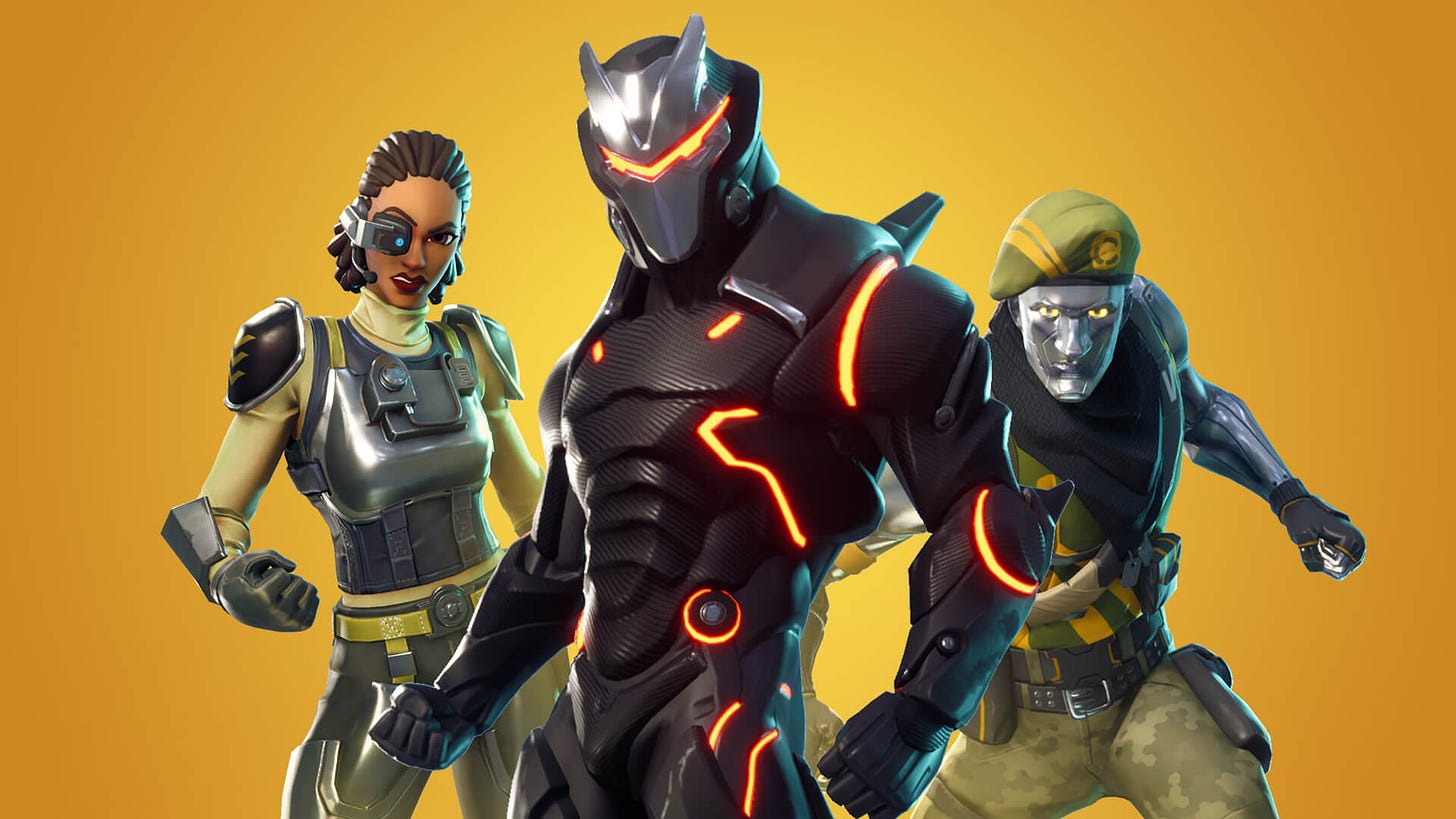Four lessons from Develop:Brighton 2024, 11/07/2024
Politics, shaky industry confidence and games media wobbles dominate the UK’s GD-Sea(side)
I share four things that I learned at Develop Brighton (and not a thing more)
Third time's the charm for Epic’s new mobile app store on iOS
Ace Combat 7: Skies Unknown flies into action in the week’s releases
Good morning VGIM-ers,
Thank you to everybody who came along to the first VGIM Business Breakfast, sponsored by Big Games Machine, yesterday.
I had a great time talking to my excellent panel about the future of the games media, as well as meeting a full blown four dozen (plus) of my lovely readers for a cuppa and a croissant. Genuinely heartwarming stuff.
As I briefly alluded to at the event yesterday, this marks the beginning of an exciting period for me, for VGIM and for Half-Space Consulting.
By the middle of August, I plan to have made three announcements that will hopefully be both exciting for you and give my whirlwind life some much needed structure. I will cue you into the details as soon as I can.
And ahead of tomorrow’s next installment of Ask George, one of my regular exclusive paid subscriber newsletters, I will remind you all that your chance to get 20% off paid VGIM Insider membership expires tomorrow.
If you think supporting my work is worth less than the cost of a pint per month (That’s £5 monthly or £40 annually), use the code below to save, save, save before it is too late.
But given that I’ve been at Develop all week, I should probably tell you what’s been going on. Let’s get to it, shall we?
The big read - Four lessons from Develop: Brighton 2024
Oh I do like to be beside the seaside? Not when it’s this bloody wet, I don’t.
From a weather perspective, this year’s Develop: Brighton has been dangerously close to a wash out. I’ve not seen this much rain at an industry conference since the Global Meteorologists Association gathered for a symposium on precipitation.
Fictional conferences aside, it has been a remarkably soggy time at the UK’s premier games business show. Yet there have been some red hot findings from the show that I feel that I must unburden myself to you, my dear readers.
Here are four findings from the chatter around a damp, but popular, industry conference.
A change of Government is a breath of fresh air for the games business…
Last week, voters in the UK swept the Conservative Party out of office in stupendous fashion - landing the Labour Party with a landslide victory over its competence bereft rivals. And even though we’re days into a new administration, the UK games industry is chuffed about the news.
As mentioned in these hallowed pages before, the UK policy environment around video games had been weakening over the past few years.
The parlous state of public finances post Covid, Brexit’s idiotic impact on our immigration landscape and the Government’s declining appetite to back video games with meaningful action provided a sense that a page was being turned on a golden age of British video games.
Labour’s arrival in Government feels like a fresh start for the sector in two key ways. The party’s ministerial front bench is much more closely aligned with the industry’s networks and interests.
Lisa Nandy, the new Culture Minister, has already disavowed the Tory party’s culture wars in favour of promoting the Best of British creativity, a welcome change of tune. Prominent Labour ministers across the front bench ‘get’ video games, including Jonathan Reynolds - the new Secretary of State for Business and Trade - who is a noted Football Manager aficionado. We even have a Prime Minister who has directly praised video games developers in Dundee and Leamington Spa for driving forward the country in speeches leading up to the election.
But more broadly than that, there is a sense that the arrival of Labour means that we will, finally, have some much needed stability within the business environment that underpins the games sector.
The size of Labour’s majority, the seriousness to which it has taken to its task of governing already and its commitment to try to keep ministers in place for an extended period of time (barring anything unexpected) has created a welcome sense of calm after years of storm.
And even though the party is planning to make some changes to our policy environment over time, there is a strong sense that games businesses can properly plan for those in a mid to long term fashion - significantly strengthening the foundations companies are building from.
Of course, we do need to reserve judgment. There was always likely to be some delight when an unpopular Government that had outlived its welcome was seen off, which will naturally dissipate in the weeks and months ahead.
There is also a real question about whether Labour’s hypothetical appetite for games is matched by the development of specific policy around the sector by Starmer’s Government, which takes games out from underneath other sectors like film and TV and establishes them as equals.
But Labour’s mixture of pragmatism and desire to get things growing aligns well with what the domestic industry needs: providing an opportunity for it to create, in the words of Ukie CEO Nick Poole, the most pro video games Parliament in history.
…but the industry still needs to regain its confidence
Despite the change of Government, industry confidence remains fragile. The “survive to 2025” mantra that has guided the sector throughout 2024 was still in use this week, even though we are (somewhat unbelievably) closer to the year that we’re meant to be surviving to than the one we’re surviving in.
There are a few reasons for that fragility. While there’s longer term bullishness about the prospects of the sector, short term cash flow is concerning a lot of companies and creating a slightly frantic need to keep business going.
Even though the momentum behind layoffs is beginning to fade, recent job losses at places like Sumo Group - which is widely respected in the national games industry - has given plenty of companies an unwelcome knock.
And though Develop itself felt busy and bustling, with literally thousands of people around, there was still a sense that a number of bigger businesses have decided to bunker down until this year’s storm has passed (note: not referring to the weather here).
The reality is that there is no quick fix to the problems facing the industry. The quiet 2024 release schedule, the wait for the Switch 2 and GTA VI and the reassertion of remorseless commercial reality on the sector’s business plans due to a decline in investment into games means that the second half of the year will remain a slog.
But there was also a sense that the industry’s painful reset is, finally, bedding in. And while this means we won’t see the record breaking investment numbers that we saw during Covid any time soon, companies that have readjusted plans and expectations were telling me that deals have been done - suggesting we’re on the right side of the road to 2025.
Video games media needs to build its own platform (rather than relying on others)
The first ever VGIM Business Breakfast asked what the future holds for video games media. And while the conversation was wide ranging, our panel, consisting or Neil Long of mobilegamer.biz, Chris Bratt of People Make Games and Ruby Spiers-Unwin of Pocket Tactics fame, agreed on one thing: games media needs to reassert its value as a platform in its own right.
Obviously, games media can never fully stand alone. News outlets covering the consumer and business side of games must inevitably use a range of platforms - such as social media, search and even humble newsletter platforms like Substack - to deliver its work to readers, listeners and viewers.
But there was strong agreement that games media’s overreliance on playing to the needs of tech platforms was undermining its survival prospects.
The panel agreed that games media outlets have become too reliant upon the mechanics of the platforms that serve them. This has led to outlets such as Kotaku abandoning their distinct strengths - such as unique original consumer games reporting - in favour of creating samey search engine optimised (SEO) guides content that has put publications at the mercy of algorithm changes by platforms.
And while the panel said games media shouldn’t lose sight of the value that platforms can give them (i.e. I probably should optimise this newsletter a bit more for search), Chris, Ruby and Neil argued that games media must restore the value of their outlets as defined platforms of their own - upon which they produce great work to serve a community within a definable niche - to overcome market challenges.
Otherwise, we risk a future where consolidations and closures narrow the media landscape around video games: weakening the cultural and commercial narrative around the medium in the process.
Time for Brighton Games Week?
Finally, a thought. Develop is an excellent business conference. But it has also evolved into a hub capable of supporting an increasingly dizzying array of micro conferences, community meetups, charity fundraisers, parties and even business breakfasts (cough).
The team that runs the conference is accommodating to this, as all events organisers must be. Nevertheless, there is a risk that there is a gap emerging between Develop as a conference and Develop as an “event” for the industry that risks a) undervaluing the show that brings us to town and b) makes it hard to discover the full range of great events taking place during the week.
The solution? Set up Brighton Games Week. By forming a steering group with Tandem Events (the organisers of Develop) at the heart of it, there’s room to turn a few days of fierce conference activity into a fuller week that gives Develop more room to shine, reduces clashes between grassroots events and opens the door for some consumer (or educational) activities to engage the local community.
And in doing so, we might be able to create a framework within which industry, local business, local Government and nearby not-for-profits can turn what is informally a games week in Brighton into a formal initiative - creating real value for all parties involved in the process.
This kind of thing isn’t easy to do. It’d take time to negotiate a fair arrangement that values Develop fully and ensures its sponsor base is strengthened (not threatened). Working with Government is challenging, especially when it has less cash than me after an all day session at The Kernel brewery in Bermondsey. And any success for an initiative like this would need to be measured in years, if not decades.
But given that there seems to be enough appetite for ever more activity during the week, and a need to better recognise the role Develop has in the local ecosystem, pulling together a Brighton Games Week could be a clever way to resolve a gentle tension in the week and create value for the local cluster in the long term.
News in brief
Epic Mind Games: Epic has had its notarisation submission to launch a new app store on iOS approved by Apple, after initially seeing it being rejected twice. The Fortnite creating funsters kicked up a fuss online after the second time Apple’s submission team said no to them, artfully using the court of public opinion to get their way in the end. Mind games worthy of Jose Mourinho at his finest.
Nintendon’t: Nintendo president Shuntaro Furukawa has suggested that the company is unlikely to use generative AI at scale anytime soon. In a call to investors, Furukawa said that the technology was a “big topic” but backed the company’s decades of experience creating great games to produce better outcomes for it than generative AI. Zing.
Nicht gut: Germany’s Federal Ministry for Economic Affairs and Climate Protection has decided to dissolve its previously independent games department - known as Games Referat - in favour of integrating it into the Department for Cultural and Creative Industries. German trade association game has described the move as ‘completely incomprehensible’, given that the Government has chosen to maintain separate departments for film, literature and music.
Canon Fodder: Swedish games trade association Dataspelsbranschen has submitted 15 games for consideration for addition to the country’s cultural canon. Games such as Minecraft, Sayonara Wild Hearts and Candy Crush Saga have been put forward to the country’s culture department, which formally announced plans to create the canon in December 2023.
Devolver the ownership: Kwalee has taken a 3.58% stake in Devolver Digital via a £7.9m ($10m) equity placement. It comes as Kwalee continues to broaden its portfolio, eschewing its previous position as a hypercasual mobile company into a cross platform publishing power.
Movers and shakers
Phil Williams is the new Director of Content at Scopely…Gemma Cooper has been appointed to head up the Games Division at DDA…Greg Cartwright has joined Raptor PR as an Associate Director…Danielle Davis has returned to Zynga as its Director of Talent Acquisition…And Viki Freeman has stepped up to the role of COO at Airship Interactive…
Jobs ahoy
Sega is hiring a new Head of Brand Marketing EMEA…And if you don’t fancy the look of that branding job, you could also apply for Jagex’s Senior Director of Brand Marketing gig…Or you could even apply for Riot Game’s role as a Senior Manager, Brand Management for Valorant in Europe (lots of brand jobs about, eh?)…Amazon Games is snapping up an Executive Producer…Lastly, Double Eleven is open for Expressions of Interest if you fancy casting your hat into the ring…
Events and conferences
BitSummit, Kyoto - 19th-21st July
ChinaJoy, Shanghai - 26th-29th July
GDL Indie Games Expo, London - 9th August
Serious Play Conference, Toronto - 12th-14th August
Gamescom, Cologne - 21st-25th August
Games of the week
Ace Combat 7: Skies Unknown - Slightly mad Japanese fighter sim series gets a seventh installment in time for the Summer.
Lifeless Moon - That’s no moon…it’s a lifeless one with thematic tones similar to Arthur C Clarke’s science fiction storytelling.
Neon White - Stylish speed running-esque first person platformer dashes onto Xbox for the first time.
Before you go…
I bet a friend that someone was going to make a Roblox experience about the general election before the campaign ended last Thursday. And with just days to go before we went to the polls, my hunch finally came good.
The BBC integrated this year’s general election into its Wonder Chase Roblox experience - allowing players to collect ballot boxes to unlock their own in-game Larry the Cat (Chief Mouser to the Cabinet Office, to give the feline his proper title).







